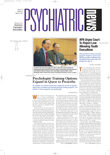When compared with adolescents receiving routine treatment for depression in school-based health clinics, those who received interpersonal psychotherapy for depressed adolescents (IPT-A) experienced greater reduction in depression symptoms and improved overall functioning.
This was the major finding of a study examining the effectiveness of IPT in urban schools published in the June Archives of General Psychiatry.
Researchers at the New York State Psychiatric Institute conducted the study in five school-based health clinics in impoverished communities in New York City. They gathered data on the mental health outcomes of 63 adolescents referred for treatment to their school's health clinic.
The lead investigator was Laura Mufson, Ph.D., an associate professor of clinical psychology in psychiatry at Columbia University College of Physicians and Surgeons and director of the department of psychology at New York State Psychiatric Institute. She adapted the therapy—which was developed in the 1980s to target depressive symptoms in adults—for use in adolescents.
IPT is a time-limited form of psychotherapy “based on the premise that depression occurs in the context of interpersonal relationships,” Mufson told Psychiatric News.
While problems in a person's relationships with others may not be the cause of the depression, she noted, they can “exacerbate and prolong depressive episodes.”
IPT, she added, focuses on one or two problems within a patient's interpersonal relationships and helps the patient develop better ways of communicating and problem solving within that area of his or her life.
To be eligible for the study, adolescents had to meet DSM-IV criteria for major depression, dysthymia, adjustment disorder with depressed mood, or depressive disorder NOS. They also had to have a score of 10 or higher on the Hamilton Depression Rating Scale (HAM-D) and 65 or lower on the Children's Global Assessment Scale.
A child psychologist determined whether students met eligibility criteria after independent evaluators, who were master's-level social workers, assessed children using the Schedule for Affective Disorders and Schizophrenia for School-Aged Children and conducted a clinical interview with the students.
The students were between the ages of 12 and 18, with an average age of 15 years; 84 percent were female, and 71 percent were Hispanic.
If at any time during the study, an adolescent's symptoms or functioning appeared to be worsening—for example, if their HAM-D score was greater than 25—he or she was referred for an evaluation by a child psychologist or psychiatrist and offered an additional treatment such as medication.
Between spring 1999 and summer 2002, 34 students were randomly assigned to receive 12 sessions of IPT-A over 16 weeks, and 29 were randomly assigned to treatment as usual, which typically included supportive counseling on an individual basis.
The mean number of sessions for the treatment-as-usual condition was about eight sessions, according to the report. Eight adolescents received one to three additional family/parent therapy sessions, and five students also participated in group therapy.
Mufson measured depressive symptoms of students in both groups using the HAM-D and Beck Depression Inventory (BDI), global functioning with the Clinical Global Impressions scale and the Children's Global Assessment Scale, and social functioning with the Social Adjustment Scale Self-Report.
At the end of the clinical trial, 17 students, or 50 percent, of those who received IPT-A met the criterion for improvement of depression as measured by the HAM-D as compared with 10 students, or 34 percent, of those who received treatment as usual.
On the BDI, 25, or 74 percent, of those receiving IPT-A met recovery criteria as compared with 15, or 52 percent, who received treatment as usual.
Adolescents who received IPT also fared significantly better on measures of global and social functioning than had those who received treatment as usual.
Mufson said she would like to see the results of the study replicated in a larger sample, and noted that IPT-A is the type of treatment clinicians can learn and conduct easily within a number of school health clinic settings.
“We were able to train the clinicians from the schools that participated in the study to conduct IPT-A with a brief training program and supervision, and they were able to implement the study with good fidelity,” she said.
The study was funded by the Substance Abuse and Mental Health Services Administration and the National Institute of Mental Health Child Psychiatry Intervention Research Center.
An abstract of the article, “A Randomized Effectiveness Trial of Interpersonal Psychotherapy for Depressed Adolescents,” is posted online at<www.archgenpsychiatry.com>.▪
